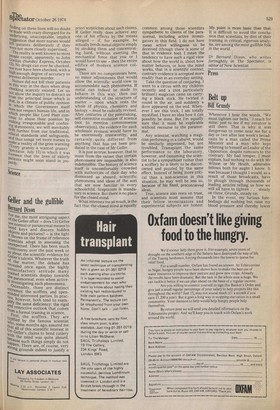Press
Belt up Bill Grundy
Whenever I hear the words, "We must tighten our belts," I reach for mine, just to see if my revolver is still there. That is why it was dangerous to come near me for a day or two after last week's broadcasts by a man called the Prime Minister and a man who kept referring to himself as Leader of the Opposition, despite rumours to the contrary. My bad temper, I must explain, had nothing to do with Mr Wilson or Mr Heath, admirable fellows both for aught I know. It was because I thought I would, as a result of those broadcasts, have to plough through thousands of leading articles telling us how we will all have to tighten . . . steady on there, Grundy, steady on.
In the event, my furious forebodings did nothing but raise my blood pressure and thereby lower my life expectation. For I was wrong. The leading articles did not go on about tightening etc. On the contrary they wanted a loosening of things. Let prices rip and bring down taxes. Damn braces, bless relaxes, as William Blake once remarked, somewhat cryptically.
Mind you, this sudden change from the Dunkirk spirit to the atmosphere of VE day led to some confusion. On Wednesday last, the Sun sounded off about Lord Stokes's remarks at the opening of the Motor Show; "Lord Stokes, chairman of Britain's biggest exporter, BLMC, says his company wants to go on doing its bit for Britain, but 'cannot plan in a vacuum'. In other words, BLMC want to know HOWto help Britain throw off what Lord Stokes calls an almost hypnotic death wish'. That is something ALL of us want. Britain has got the message about going broke. The Sun has been spelling it out for years. All the parties now agree."
Now, if you ignore that very funny bit about the Sun being the chief economic adviser to the country, there is some sense in what the leading article says. And it is quite obvious that the Sun approves of Lord Stokes's speech. Not so the Daily Telegraph. On the same day that the Sun was applauding his Lordship, the Telegraph leading article was saying: "It is hard to make much sense out of what Lord Stokes had to say, yesterday on the eve of the Motor Show. He seemed to be asking people to stop pointing to the deficiencies and problems afflicting much of British industry •because this 'causes unrest and demoralisation at work'. Does he imagine that the problems will go away if they are not mentioned? If not, how can they be solved if they are not discussed?" Search me, as the willing lady said to the Customs , officer.
But stay awhile. I hesitate to say this but was the Telegraph, I wondered, accusing Lord Stokes of something he hadn't actually said? Only one way to find out: go back to the original source, the speech itself. And on examining it, I find that the Sun was much nearer to what Lord Stokes was saying than the Telegraph was. For what Lord Stokes asked for was an end to "speculation, not only about our company, but about many others." 'chat was what causes unrest and demoralisation at work, he said, Idle speculation. Not discussion of problems. Lord Stokes, I am sure, would welcome someone pointing out deficiencies in his company, and would immediately institute discussions about overcoming them. I imagine the Telegraph leader writer knows that, too. So why the misrepresentation, because misrepresentation it certainly was?
Well, to answer that you have to look at another part of Lord Stokes's speech. In it, he asked for the Government to disclose its longterm plans so that industry could work with it. "I believe we are all on the same side and the sooner everybody realises that the better." Now the Telegraph, of course, doesn't believe we are all on the same side. So possessed by dogma
is it that the idea of buckling down with anything other than a Conservative government makes it feel slightly faint. Lord Stokes, the Telegraph thought, is clearly talking through his bonnet. He "seems to be hoping for greater collaboration between industry and government." Not "seems," but is, ducky. If the Sun can see, so' can you. Of course a paper's politics will colour its leading articles. In fact, its leading articles should be the one place where a paper's politics are noticeable. (What a treacherous little phrase is "should be".) But if you are going to sound off about things it's as well to be honest about them. Which is what the Telegraph didn't seem to me to be. Except for its blazing peroration: "What the motor industry actually needs is not different in principle from what the rest of British industry needs. It is price freedom and less taxation." Which sounds remarkably like where we came in. Excuse me while I adjust my buckle. This belt is killing me.











































 Previous page
Previous page